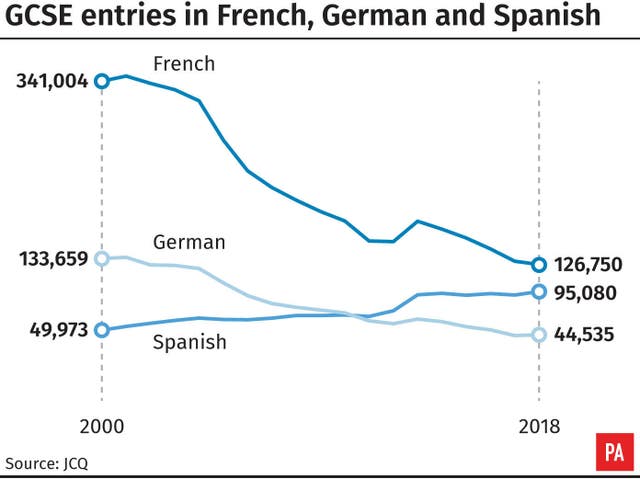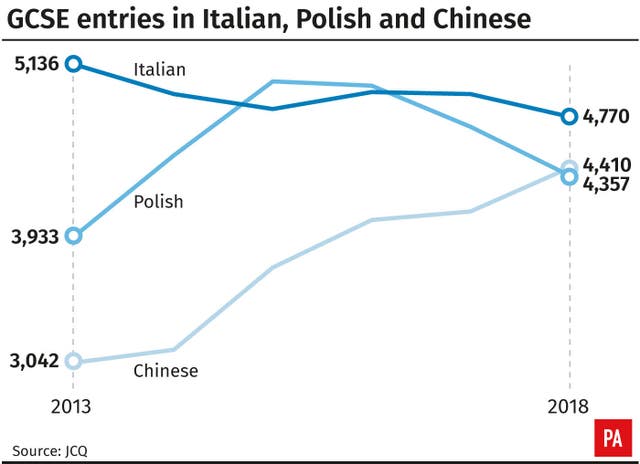
Entries for GCSE French continued to decline this year, but German has seen a slight rise, national exam results show.
While French continues to be the most popular modern foreign language, there were 3,759 fewer UK entries for the subject compared to last year.
Entries for the language have generally been falling since the start of the century.
There was a slight uptick in 2013, before numbers resumed their descent.

Meanwhile, entries for German, which have also been dropping since 2000, increased this year, with 886 more taking the language.
Spanish saw another increase this year, with 4,040 more entries compared to 2017.
German and Spanish also saw a rise in entry numbers in 2013.
The rises in these three languages five years ago is likely to have been caused by the Government’s introduction of the English Baccalaureate (EBacc) which recognises teenagers who take GCSEs in English, maths, science, history or geography and a language.
Students taking GCSEs in 2013 had not made their GCSE choices when the EBacc was announced, and may have picked, or been encouraged by schools to take courses that fitted with the Government measure.

The latest figures also show that Chinese continues to increase in popularity, with 4,410 entries in total, up from 4,104 last year.
Arabic has also seen an increase in entries, while Italian has seen a fall.
Suzanne O’Farrell, curriculum and assessment specialist at the Association of School and College Leaders, said there were indications the rise in German and Spanish may have been caused by pupils moving across from IGCSEs, which no longer count in school performance tables, to GCSE courses.
Mark Herbert, director of schools and skills at the British Council, said: “The slight rise in pupils studying languages at GCSE is encouraging, particularly at a time when the UK is looking to establish a new position on the global stage.
“Now more than ever our young people need to be equipped with the knowledge and skills to succeed in the internationally competitive economy.
“A survey of schools we conducted earlier this year suggested that more rigorous GCSEs may already be improving students’ linguistic competency, but also that lower ability pupils now appear less likely to take a language in the first place – so it’s vital we make language learning accessible for everyone, no matter their background.
“After a sustained period of decline German has had its first increase in years at GCSE, while Spanish continues to grow in popularity, to the extent it is likely to overtake French at GCSE in the next decade.
“Our research shows Spanish and German will be among the most important languages post-Brexit, along with Mandarin, French and Arabic.
“The popularity of Spanish may be accounted for by a perception it’s easier to pick up than other languages, along with the fact that Spain is the most popular holiday destination for Brits, so young people can imagine having the chance to put what they learn in the classroom into practice.”


Comments: Our rules
We want our comments to be a lively and valuable part of our community - a place where readers can debate and engage with the most important local issues. The ability to comment on our stories is a privilege, not a right, however, and that privilege may be withdrawn if it is abused or misused.
Please report any comments that break our rules.
Read the rules here